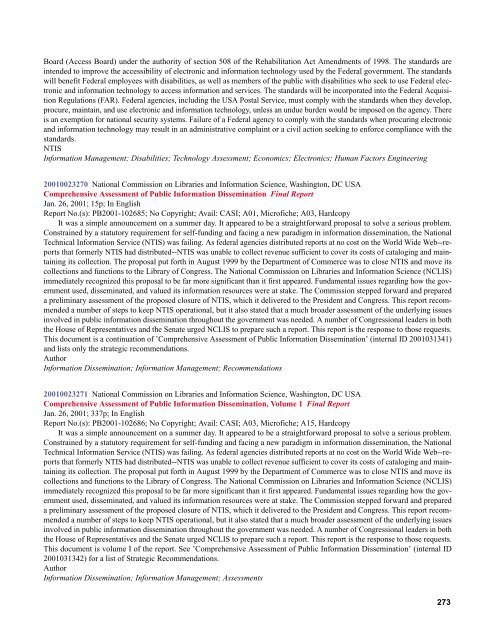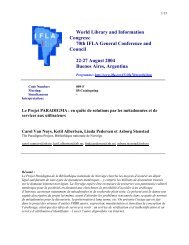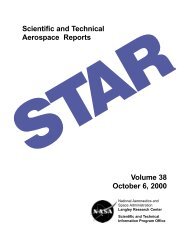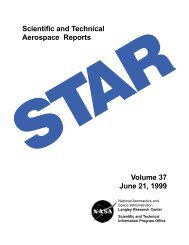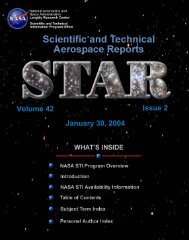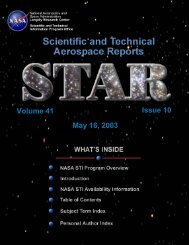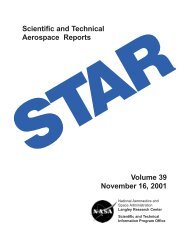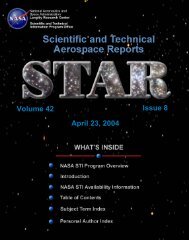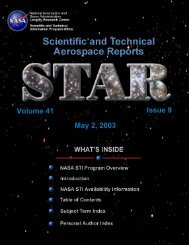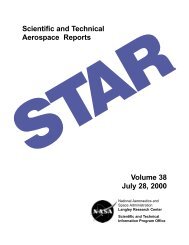Scientific and Technical Aerospace Reports Volume 39 April 6, 2001
Scientific and Technical Aerospace Reports Volume 39 April 6, 2001
Scientific and Technical Aerospace Reports Volume 39 April 6, 2001
Create successful ePaper yourself
Turn your PDF publications into a flip-book with our unique Google optimized e-Paper software.
Board (Access Board) under the authority of section 508 of the Rehabilitation Act Amendments of 1998. The st<strong>and</strong>ards are<br />
intended to improve the accessibility of electronic <strong>and</strong> information technology used by the Federal government. The st<strong>and</strong>ards<br />
will benefit Federal employees with disabilities, as well as members of the public with disabilities who seek to use Federal electronic<br />
<strong>and</strong> information technology to access information <strong>and</strong> services. The st<strong>and</strong>ards will be incorporated into the Federal Acquisition<br />
Regulations (FAR). Federal agencies, including the USA Postal Service, must comply with the st<strong>and</strong>ards when they develop,<br />
procure, maintain, <strong>and</strong> use electronic <strong>and</strong> information technology, unless an undue burden would be imposed on the agency. There<br />
is an exemption for national security systems. Failure of a Federal agency to comply with the st<strong>and</strong>ards when procuring electronic<br />
<strong>and</strong> information technology may result in an administrative complaint or a civil action seeking to enforce compliance with the<br />
st<strong>and</strong>ards.<br />
NTIS<br />
Information Management; Disabilities; Technology Assessment; Economics; Electronics; Human Factors Engineering<br />
<strong>2001</strong>0023270 National Commission on Libraries <strong>and</strong> Information Science, Washington, DC USA<br />
Comprehensive Assessment of Public Information Dissemination Final Report<br />
Jan. 26, <strong>2001</strong>; 15p; In English<br />
Report No.(s): PB<strong>2001</strong>-102685; No Copyright; Avail: CASI; A01, Microfiche; A03, Hardcopy<br />
It was a simple announcement on a summer day. It appeared to be a straightforward proposal to solve a serious problem.<br />
Constrained by a statutory requirement for self-funding <strong>and</strong> facing a new paradigm in information dissemination, the National<br />
<strong>Technical</strong> Information Service (NTIS) was failing. As federal agencies distributed reports at no cost on the World Wide Web--reports<br />
that formerly NTIS had distributed--NTIS was unable to collect revenue sufficient to cover its costs of cataloging <strong>and</strong> maintaining<br />
its collection. The proposal put forth in August 1999 by the Department of Commerce was to close NTIS <strong>and</strong> move its<br />
collections <strong>and</strong> functions to the Library of Congress. The National Commission on Libraries <strong>and</strong> Information Science (NCLIS)<br />
immediately recognized this proposal to be far more significant than it first appeared. Fundamental issues regarding how the government<br />
used, disseminated, <strong>and</strong> valued its information resources were at stake. The Commission stepped forward <strong>and</strong> prepared<br />
a preliminary assessment of the proposed closure of NTIS, which it delivered to the President <strong>and</strong> Congress. This report recommended<br />
a number of steps to keep NTIS operational, but it also stated that a much broader assessment of the underlying issues<br />
involved in public information dissemination throughout the government was needed. A number of Congressional leaders in both<br />
the House of Representatives <strong>and</strong> the Senate urged NCLIS to prepare such a report. This report is the response to those requests.<br />
This document is a continuation of ’Comprehensive Assessment of Public Information Dissemination’ (internal ID <strong>2001</strong>031341)<br />
<strong>and</strong> lists only the strategic recommendations.<br />
Author<br />
Information Dissemination; Information Management; Recommendations<br />
<strong>2001</strong>0023271 National Commission on Libraries <strong>and</strong> Information Science, Washington, DC USA<br />
Comprehensive Assessment of Public Information Dissemination, <strong>Volume</strong> 1 Final Report<br />
Jan. 26, <strong>2001</strong>; 337p; In English<br />
Report No.(s): PB<strong>2001</strong>-102686; No Copyright; Avail: CASI; A03, Microfiche; A15, Hardcopy<br />
It was a simple announcement on a summer day. It appeared to be a straightforward proposal to solve a serious problem.<br />
Constrained by a statutory requirement for self-funding <strong>and</strong> facing a new paradigm in information dissemination, the National<br />
<strong>Technical</strong> Information Service (NTIS) was failing. As federal agencies distributed reports at no cost on the World Wide Web--reports<br />
that formerly NTIS had distributed--NTIS was unable to collect revenue sufficient to cover its costs of cataloging <strong>and</strong> maintaining<br />
its collection. The proposal put forth in August 1999 by the Department of Commerce was to close NTIS <strong>and</strong> move its<br />
collections <strong>and</strong> functions to the Library of Congress. The National Commission on Libraries <strong>and</strong> Information Science (NCLIS)<br />
immediately recognized this proposal to be far more significant than it first appeared. Fundamental issues regarding how the government<br />
used, disseminated, <strong>and</strong> valued its information resources were at stake. The Commission stepped forward <strong>and</strong> prepared<br />
a preliminary assessment of the proposed closure of NTIS, which it delivered to the President <strong>and</strong> Congress. This report recommended<br />
a number of steps to keep NTIS operational, but it also stated that a much broader assessment of the underlying issues<br />
involved in public information dissemination throughout the government was needed. A number of Congressional leaders in both<br />
the House of Representatives <strong>and</strong> the Senate urged NCLIS to prepare such a report. This report is the response to those requests.<br />
This document is volume I of the report. See ’Comprehensive Assessment of Public Information Dissemination’ (internal ID<br />
<strong>2001</strong>031342) for a list of Strategic Recommendations.<br />
Author<br />
Information Dissemination; Information Management; Assessments<br />
273


